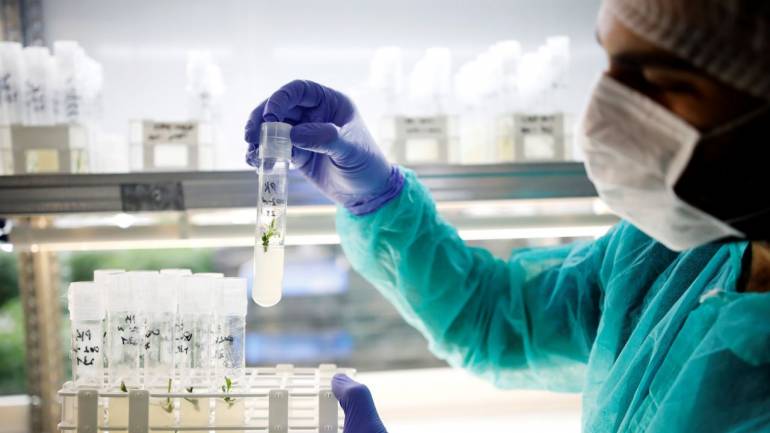Industry complains that most of these fresh graduates coming out of the pharmacy colleges are out of sync with the modern manufacturing practices.
As NDA 2 gears up for its first Union Budget, all eyes will be on first-time Finance Minister Nirmala Sitharaman. She has her plate full, laden with issues like farmer distress, sluggish investment cycle, flagging exports, among others. But, on top of the heap will be the issue of jobs and the lack of employment opportunities for India's burgeoning young population.
The problem is not merely about enough jobs not being created. In some of the industries, the crisis is also due to a sluggish response to structural changes, leaving many jobless.
In a four-part series, Moneycontrol looks at how some of the major sectors of the Indian economy are faring.
Meghana Mangaj, 26, from Belgaum in North Karnataka, works as a Quality Assurance Officer at Lupin’s manufacturing site in South Goa. Her job is to ensure that every production batch released from manufacturing line adheres to certain quality standards.
Mangaj was straight out of her 12th grade when she was picked up by Lupin through a programme called ‘Learn and Earn’ in 2011.
For the next three years, she worked on the shop floor on weekdays, and attended classes on the weekend. She was trained on pharmaceutics, pharmaceutical engineering, costing and inventory, regulatory affairs, computers and English. She was taught behavioral skills like communication, ethics, leadership, planning and time management.
During those three years, Mangaj received a monthly stipend from Lupin, which also provided subsidised accommodation, transport and canteen facilities.
After completion of the programme, Mangaj received a BSc degree in Industrial Drug Sciences from Yashwantrao Chavan Maharashtra Open University, along with a job offer from Lupin.
Even better, people like Mangaj, who completed the training, also had the option to pursue higher studies or go on to work with some other company.
Mangaj was nervous while signing up for the programme. She had no clue about the pharma industry. She now supports her family through her earnings.
Lupin’s Learn and Earn programme has trained a total of 560 young people since it started in 2011. Many of the trainees are from poor and marginalised communities from rural backgrounds. The company plans to scale up the programme to 1,000 people by 2020.
Initiatives such as these have started to play an important role in an industry that has been one of India’s fastest-growing but has lately started to face some challenges.
Chief among them is the unemployability problem.
The country churns out over 2,25,000 pharmacy and allied science graduates compared to just about 17,000 in US. But the advantage ends there.
The industry complains that most of these fresh graduates coming out of pharmacy colleges are out of sync with modern manufacturing practices.
"They have little practical training, many of them have no idea about the current good manufacturing practices (GMP) followed on the shop floor. Some of them may have learnt about aseptic manufacturing in their books, but never saw it," says a senior executive of a pharma company.
The past few years have seen manufacturing quality at Indian companies come under a sharp glare of the regulatory bodies such as the US FDA.
"With the rising expectations of quality and compliance by global regulators, we have found even existing employees need re-skilling, periodic assessments and re-orientation towards quality as a culture," the executive adds.
What makes the problem worse is that, naturally, companies are looking for the more cost-effective solution out.
"A lot of times, human errors and negligent attitude of plant workers have cost the companies dearly during regulatory inspections. So we are investing in automation, to remove human element as much as possible at least in our upcoming plants," the executive says.
But other companies are looking for the more humane method, by opting for programmes such as Lupin’s Learn and Earn.
"Lupin was recruiting 1,000-plus fresh graduates every year with no relevant job skills, there was a need for job-ready graduates with appropriate technical and life skills," a Lupin spokesperson tells Moneycontrol.
This was how Learn and Earn was conceptualised. Hire youngsters and put them through your own programme that makes them job-ready.In 2011, the idea was executed by hiring the first batch of Learn and Earn in 2 phases: Phase 1 from Goa and Tarapur, Phase 2 from Indore and Aurangabad. In Phase-3, the company has added Sikkim and Dabhasha, Gujarat manufacturing sites as well.
Lupin insiders say the programme is a huge success, helping the company overcome the difficulty of getting technically-proficient employees for manufacturing facilities located far from urban centres.
It's not Lupin alone, others like Zydus Cadila, Dr Reddy's and Cipla have also since adopted this template.
For instance, the Government of Goa has collaborated with Cipla to launch the Cipla Technical Academy in October 2018. Students with a background in science, undergraduates or graduates holding B.Sc., M.Sc. and B. Pharm degrees or diplomas undergo a six-month training at the academy, followed by onsite training.
On completion, Cipla absorbs the candidates into their workforce based on a need basis.
To take these initiatives to next level, the Indian Pharmaceutical Alliance, the lobby group that represents large domestic pharmaceutical companies has founded an Entry level Training academy wherein it trains personnel for operator level jobs in order to inculcate quality in manufacturing from the shop floor and upwards.
Started in 2018, so far, around 270 personnel have been trained at the Cipla Academy with four companies taking part in the placement. The training academy will also act as upskilling and assessment centre for working professionals.
"We hope to continue with this initiative and roll it out to more number of companies now," IPA says.
The government too joined hands to help the industry to bridge the skill gap through Life Sciences Sector Skill Development Council (LSSSDC). The LSSSDC works on public-private partnership mode. While the government provides funds for the training, the industry chips with the curriculum and training regimen.
So far it assessed over 15,000 freshly skilled candidates across 12 major job roles, across India, with focus on all the major centres of Life Sciences activity, and helped 70 percent to get placements with various companies.
“Healthcare offers a great opportunity for job creation, both in manufacturing and in the service sector. We need to build upskilling of capability and dovetail our syllabus to meet the changing requirement of healthcare to leverage the demographic advantage of India”, says Sudarshan Jain, Secretary General, IPA.
This was the concluding part of the four-part special series on challenges on job security. Yesterday's story highlighted the seven-year stagnation in freshers salary in the IT industry.India Union Budget 2019: What does Finance Minister Nirmala Sitharaman have up her sleeve? Click here for top and latest Budget news, views and analyses.



















